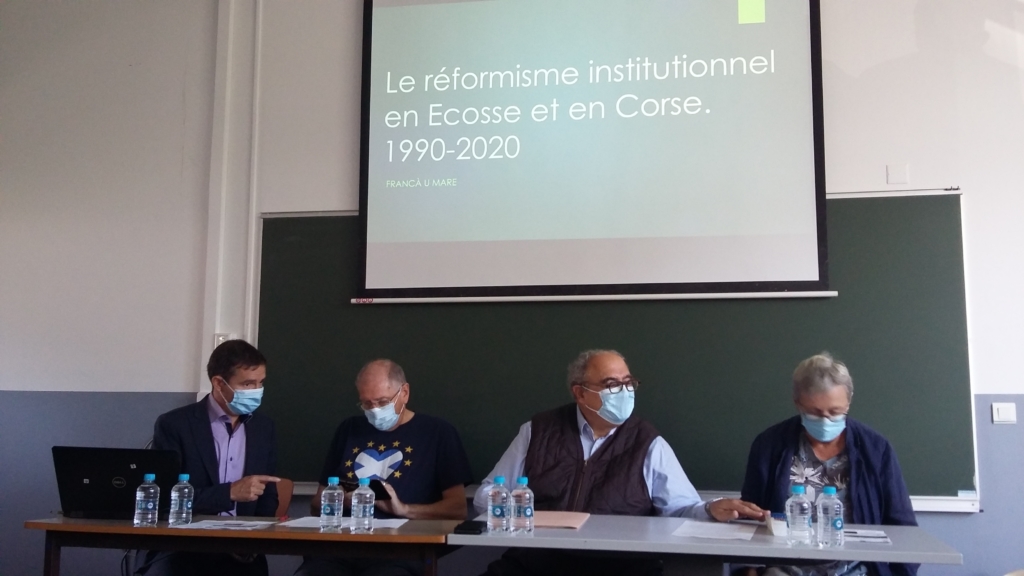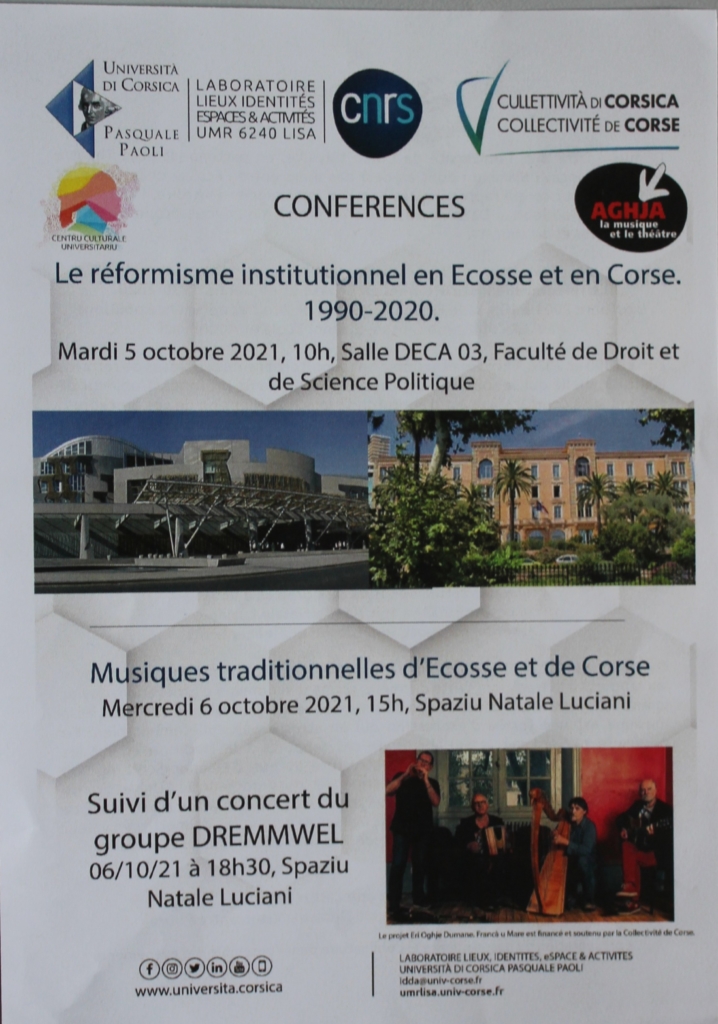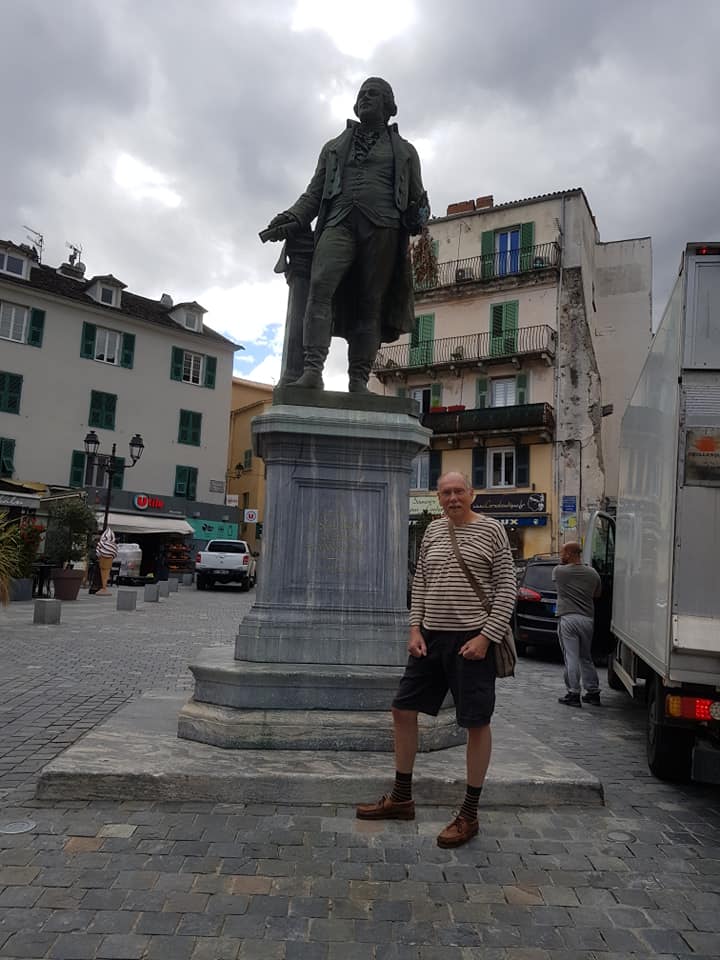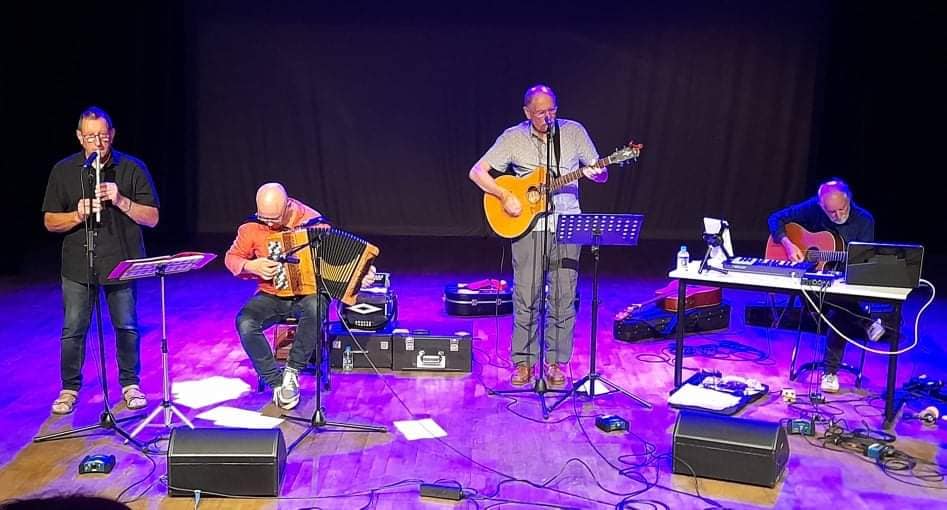Franca u mare 2021
Is Corsica like Scotland with fine weather? Rob Gibson explores their links across the seas.
Francà u mare, in Corsican language means crossing the sea. Building bridges between Scotland and Corsica has been the aim since its formation of Theatre Point in Edinburgh in 1985. The company founder Francis Aïqui relocated to his father’s native island of Corsica and in 1989 produced a seminal play Paoli, Boswell, Bonaparte.
The first real Scottish interest in the Mediterranean island occurred through James Boswell’s grand tour of Europe and his meeting with Jean-Jacques Rousseau. The sage recommended the bold boy to visit Corsica in 1765 where Pasquale Paoli had liberated the island from the Genoese after a thirty-year struggle. Thereafter Boswell championed Paoli’s cause for many years starting with his best seller of his travels to the island in 1768. The Corsican leader had founded a university, ordered conscription and adopted the moor’s head flag. It was a modern revolution years before the French one.
But Billy Kay’s book The Scottish World notes, Boswell’s vision for Corsica ‘is of a feudal Arcadia and Utopia removed from the corrupting influences of the modern world’. Boswell’s visit became possible by the lull after Genoese withdrawal and French invasion. The latter was encouraged by the prominent Bonaparte family of Ajaccio, whose son, Napoleon, worked his bloodthirsty way up to become Emperor of France.
For two short years during the French Revolutionary War, an Anglo-Corsican Kingdom was created. When the viceroy, Edinburgh-born Sir Gilbert Elliot, arrived in 1794 he claimed, ‘Corsica is Scotland with a fine climate’. He was later promoted to Governor General of India.
Politics is never far from the surface in an island of 340,000 people with a long history of opposition to Paris diktat. Our project leader, Marie-Jeanne Nicoli is a granddaughter of the Communist resistance leader in WW2 who was captured, tortured and shot by the Italian occupation forces in 1943. He appears on street names and a large car ferry of the Corsican line bears his name.
The fight to take back Corsica for her people continues despite attempted annexation by Italy, during WW2 and from France. In the 1960s the influx of pieds noirs, French exiles from Algeria, had been another catalyst for Corsican militancy. A violent confrontation with the French CRS was defused when Paris agreed to set up its smallest region in 1982. This granted Corsica more executive powers than other French regions like Brittany. Today Corsica’s underdevelopment attracts considerable subsidies from Paris and Brussels to modernise its services and industries in the island marketed as Ile de Beauté.
Since coming to Edinburgh in the 1970s Francis Aïqui has promoted various Scots/Corsican projects more recently from his base at Aghja Theatre in Ajaccio. The latest round in 2016 gained financial backing from the Collectivité de Corse – Collettività di Corsica, the Island Region created in 1991. Links from Scotland included the bands Skerryvore and Niteworks playing in the Ajaccio theatre. A Burns Supper cabaret and several Scottish artistic weeks have been arranged.
I met Francis and colleagues in Edinburgh before the first Covid lockdown. All our plans went into deep freeze but emerged this summer in collaboration with Breton band Dremmwel whose 2019 album Hirbad took the theme of a global juke box.
Situated almost half way between Scotland and Corsica, Brittany is the bridge between us. Dremmwel, which mean horizon, were the catalyst. Previously they have played in Corsica and toured three times in Scotland most recently in 2019. I have sung with them at various gigs here and in Brittany and their arrangements have given fresh arrangements to some old Scots songs.
From October 4th to 10th this year our party flew from Nantes to Ajaccio and drove the tortuous road to Corte, the island’s ancient capital and the base of Pasquale Paoli and his brief regime. His name is revered in this university named for him, with an appropriate statue in the eponymous square of the small town with a bustling student population. The town is dominated by the citadel extended to express French power and surrounded by mountains twice the height of Ben Nevis.
The themes for our debates, talks and concerts were two-fold; modern political change in the devolution era and assessing the evolution of our age-old folk music.
The political debate for students in the Faculté de Droit et de Science Politique was hosted by Prof. André Fazi, a Corsican singer in his youth and now a skilled teacher and commentator on Corsican politics. During the previous week he had addressed the European Free Alliance (EFA) away-day in Bastia, the northern Corsican port city. The EFA, allied to the much larger Green group in the European Parliament, heard from Catalan leader Oriel Junqueras, leader of the Catalan Left recently released from prison for aiding the independence referendum.

Debate at university in Corte Andre Fazi, Rob Gibson, Paul Giacobbi, Eleanor Scott.
My partner Eleanor Scott and I shared the floor with Paul Giacobbi, president of the Corsican Executive council 2010-15 and someone not at all in favour of Corsican independence. As former SNP and Scottish Green MSPs we explored the early Labour/ Liberal executive of 1999 to 2007, the IndyRef campaign and the Smith Commission results, and of course the Brexit debacle. All this we conducted in French with appropriate slides.
Questions from the floor hit on Scotland’s quest for the right of self-determination which is also the wish of the autonomist and nationalist majority in the Corsican regional assembly. Retorts from the audience to Giacobbi’s temporising, even patronising manner, included a reasoned response from Jean-Guy Talamoni. Now a professor of history in the university, he was recently nationalist leader of Corsica Libera. Talamoni was president of the Corsican Assembly from December 2015 to July this year. His party failed to get the threshold required to fight the second round and he opted to stand down. Giacobbi and Talamoni were like chalk and cheese.

Corsica’s geology is part granite and part schist like the Scottish Highlands, but the routes to the interior have hundreds more bends on the Bealach na Bà to Applecross. In consequence, some of us took the train back from Corte to Ajaccio. We counted thirty-three tunnels and numerous loops round steep mountain slopes on the journey.

Author at the Pasquale Paoli Statue, Corte
The musical themes of our project were twofold. First an account of Corsican polyphonic singing and how regional styles interpret well-known compositions. Our friend Dr Catherine Herrgott explained the intricacies with recorded examples of four part singing at the Corte event and with a live male threesome in Ajaccio.
My theme was a historic evolution of Scottish traditional music both orally and instrumentally. The people’s music parted company with art music at the time of the Reformation and gave birth to the ‘folk underground’. In contrast Corsican music is often strongly influenced by Catholic religious ritual that underpins Corsican life.
On a previous visit to the north east of the island, I witnessed the influence of colourful confreries, religious-based, friendly societies. I visited some of their mother churches in Bastia which contain sumptuous decoration, statuary and paintings. Their encouragement of polyphonic singing is a local expression of often isolated villages you only reach by tortuous mountain roads.
Local rivalry and clannish adherence to one’s own roots is a surviving element of Corsican life, even if these roots in semi-deserted villages are only home to the very old and retired islanders today. Fewer young people head for the hill villages at weekends.
Our evening concerts were well-received with the Breton gavotte and an dro tunes leading to communal dancing. Post-concert conversations agreed that a match of young Scottish traditional players with young Corsican musicians could be a follow up.

On our last night before the flight back to Nantes, Francis Aïqui and Marie Jeanne Nicoli joined us for a final aperitif in the busy heart of downtown Ajaccio. We agreed to promote the next chapter of Scottish and Corsican friendship. As a token of that friendship I present them both with copies of the Illustrated Declaration of Arbroath by Andrew Redmond Barr. Appropriate, in my view, for the wish of our two countries is to gain full nationhood. Also it recalls that arch-Unionist James Boswell quoted the most famous passage in the 1320 letter by the Scottish Barons to the Pope on the title page of his best seller – An Account of Corsica first published in 1768.
We can do so much more today to celebrate solidarity of our currently, stateless nations especially working through the European Free Alliance and developing the Francà u mare project.
